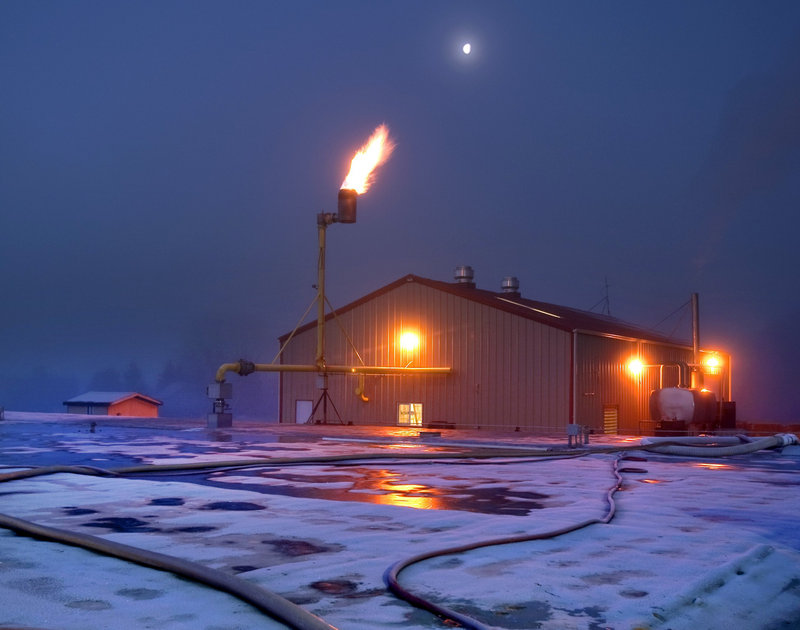MONROE, Wash. – It’s 5 a.m. at the Werkhoven Dairy — happy hour for Holsteins.
From a 5,000-gallon black tank containing beer and wine, Andy Werkhoven adds two pounds of alcohol to the feed of each of the 1,000 milking cows.
“Cow-bernet,” he jokes. Not to mention a little Bud Light, Coors and any other out-of-date alcohol that stores can’t sell.
Old MacDonald’s Farm this isn’t.
In fact, as dairy farmers everywhere seek to stay in business and meet tougher-than-ever environmental standards, they are finding new ways not only to feed cows, as Andy and his brother Jim Werkhoven have discovered, but to deal with the waste as well — turning manure into money by letting it generate electricity.
Like so many dairy farmers, the Werkhovens felt the pinch in 2008 when milk prices plunged, hay prices rose and there was the ever-present issue of finding appropriate ways to dispose of waste. Right and left, dairies were going under — even those like the Werkhoven Dairy, which has operated for decades.
“I’m just glad my dad wasn’t around to see it,” Andy Werkhoven said. Sam Werkhoven, who started the dairy in 1959 with 25 cows, died several years ago.
When Daryl Williams of the Tulalip Tribes strolled into their pasture one day with an idea on how to turn manure to money, Andy Werkhoven was ready to listen.
The Tulalips were interested because the Werkhoven Dairy is at the confluence of the Skykomish and Snoqualmie rivers, the historic fishing area for the tribe.
Williams’ idea was forming a nonprofit group, Qualco Energy, and buying an anaerobic digester to turn manure to methane, which in turn powers a generator that puts electricity on the grid.
In Washington, there are six digester systems, and a seventh is being built in Enumclaw. Some serve more than one farm, and although no one has added up the energy they make all together, they are helping preserve the water quality of rivers for the generations to come, environmentalists say.
“When properly installed, they … provide an overall environmental benefit,” said Larry Altose, spokesman for the Washington Department of Ecology. “The process takes … waste and converts it to a resource, and in doing so helps protect water quality … . It recovers invaluable nutrients … from the solids left over and it can be very beneficial to the farm economy.”
Digesters also help control the odor problem from farms and show “great promise” for the dairy industry, Altose said.
To produce energy from what went into Bessie and back out — along with other biowaste products that would otherwise have ended up in the sewer or landfill — is the dairy trend for the future, said Mark Leader of the Washington Dairy Products Commission.
Washington’s dairies are a $2.3 billion annual industry, when the total economic impact to the state is calculated, and second only to apples in agricultural-product sales, said Blair Thompson, communications director for the Dairy Farmers of Washington.
At Werkhoven Dairy, sales of milk — and also electricity and compost — keep the dairy viable while preserving air and water quality and protecting salmon streams.
The manure from the dairy goes through a complex treatment system, is sent by pipe to the digester about a mile away, and produces enough electricity to power 300 Puget Sound Energy customers.
The Werkhoven Dairy is considered a model of environmental sustainability and, along with George DeRuyter & Sons Dairy in Outlook, Wash., has been nominated for the U.S. Dairy Sustainability Awards to be decided in coming weeks.
The awards are intended to encourage dairies to turn to projects such as the Werkhovens did, Leader said.
Send questions/comments to the editors.



Success. Please wait for the page to reload. If the page does not reload within 5 seconds, please refresh the page.
Enter your email and password to access comments.
Hi, to comment on stories you must . This profile is in addition to your subscription and website login.
Already have a commenting profile? .
Invalid username/password.
Please check your email to confirm and complete your registration.
Only subscribers are eligible to post comments. Please subscribe or login first for digital access. Here’s why.
Use the form below to reset your password. When you've submitted your account email, we will send an email with a reset code.